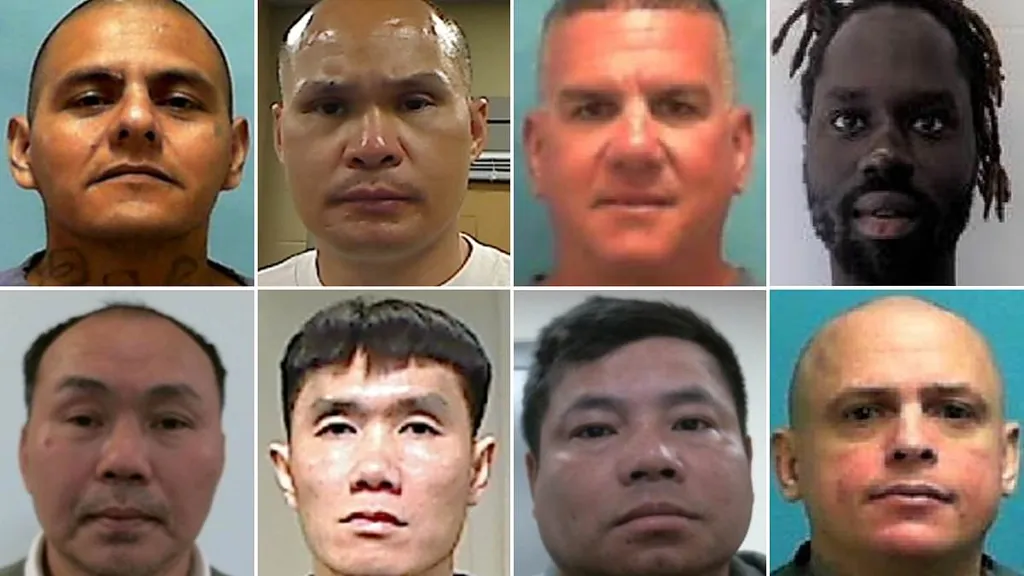More than a dozen ICE officers alongside a group of eight migrants that had been placed on a deportation flight originally bound for South Sudan are now being held in a converted shipping container on a US naval base in Djibouti in the stifling heat, in horrendous conditions.
The men and their guards are dealing with baking hot temperatures, smoke from nearby burn pits and the looming threat of rocket attacks, the Trump administration said.
Neither the officers or migrants can leave container until the matter has been resolved by the courts, which could take weeks.
Officials outlined grim conditions in court documents filed before a federal judge overseeing a lawsuit challenging Immigration and Customs Enforcement efforts to swiftly remove migrants to countries they didn't come from.
Authorities landed the flight at the base in Djibouti, about 1,000 miles from South Sudan, more than two weeks ago after US District Judge Brian E. Murphy in Boston found the Trump administration had violated his order by swiftly sending eight migrants from countries including Cuba and Vietnam to the east African nation.
The judge said that men, which include murderers and sexual abusers from Myanmar, Cuba, Vietnam, Laos, Mexico and South Sudan must have a real chance to raise fears about dangers they could face in South Sudan.
All eight were accused of being convicted criminals by the Trump administration and deported in late May after their respective origin countries all rejected them being returned.
The men's lawyers have still not been able to talk to them, said Robyn Barnard, senior director of refugee advocacy at Human Rights First, whose stated mission is to ensure the United States is a global leader on human rights.
More than a dozen ICE officers alongside a group of eight migrants that had been placed on a deportation flight originally bound for South Sudan are now being held in a converted shipping container on a US naval base in Djibouti in the stifling heat, in horrendous conditions
'This Massachusetts District judge is putting the lives of our ICE law enforcement in danger by stranding them in Djibouti without proper resources, lack of medical care, and terrorists who hate Americans running rampant,' DHS spokeswoman Tricia McLaughlin said in a post on X.
'Our @ICEgov officers were only supposed to transport for removal 8 convicted criminals with final deportation orders who were so monstrous and barbaric that no other country would take them. This is reprehensible and, quite frankly, pathological.'
On Friday, Barnard spoke at a hearing of Democratic members of Congress and said some family members of the men had been able to speak with them on Thursday.
The migrants have been previously convicted of serious crimes in the US, and President Donald Trump's administration has said that it was unable to return them quickly to their home countries.
The Justice Department has also appealed to the Supreme Court to immediately intervene and allow swift deportations to third countries to resume.
The case comes amid a sweeping immigration crackdown by the Republican administration, which has pledged to deport millions of people who are living in the United States illegally.
The legal fight became another flashpoint as the administration rails against judges whose rulings have slowed the president's policies.
The Trump administration said the converted conference room in the shipping container is the only viable place to house the men on the base in Djibouti, where outdoor daily temperatures rise above 100F, according to the declaration from an ICE official.
The men and their guards are dealing are living in a shipping container and contending with baking hot temperatures, smoke from nearby burn pits and the threat of rocket attacks
Nearby burn pits are used to dispose of trash and human waste, and the smog cloud makes it hard to breathe, sickening both ICE officers guarding the men and the detainees, the documents state.
The stench is so bad and the air so polluted that some officers now sleep with face masks on. Officers and detainees became sick within 72 hours of landing in Djibouti.
So far, thirteen ICE officials have fallen ill and are suffering from respiratory infections, together with the extreme heat and cramped living conditions.
The ICE officials are experiencing 'coughing, difficulty breathing, fever, and achy joints,' the court documents state.
They don't have access to all the medication they need to protect against infection, and the ICE officers were unable to complete anti-malarial treatment before landing, an ICE official said.
'It is unknown how long the medical supply will last,' Mellissa B. Harper, acting executive deputy associate director of enforcement and removal operations, said in the declaration.
The group also lacks protective gear in case of a rocket attack from terrorist groups in Yemen, a risk outlined by the Department of Defense, the documents state.
Camp Lemonnier in Djibouti is the largest US military base in Africa
An US airman walks towards a housing area composed of containerized living units at Camp Lemonnier, Djibouti (file photo)
Along with the deportees, the ICE agents are forced to stay in the makeshift detention center with just six beds between the entire group.
The detainees are also facing uncomfortable conditions only being able to shower once every other day while being subjected to 'pat-downs and searches' every time they need to use the restroom, some 40 yards away from the container in where they're being held.
'The conference room in which the aliens are housed is not equipped nor suitable for detention of any length, let alone for the detention of high-risk individuals,' Harper wrote.
'Notably, the room has none of the security apparatus necessary for the detention of criminal aliens. If an altercation were to occur, there is no other location on site available to separate the aliens which further compromises officers' safety.'
